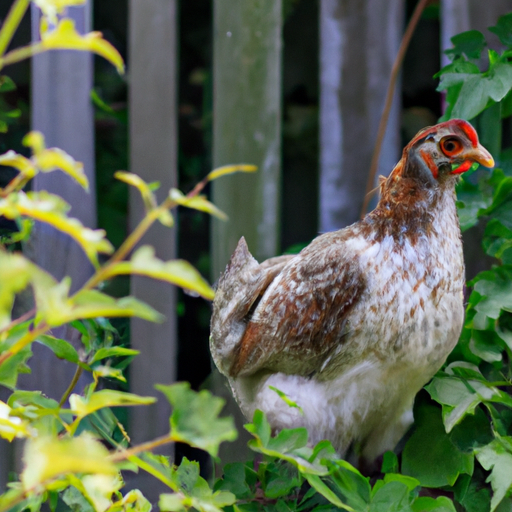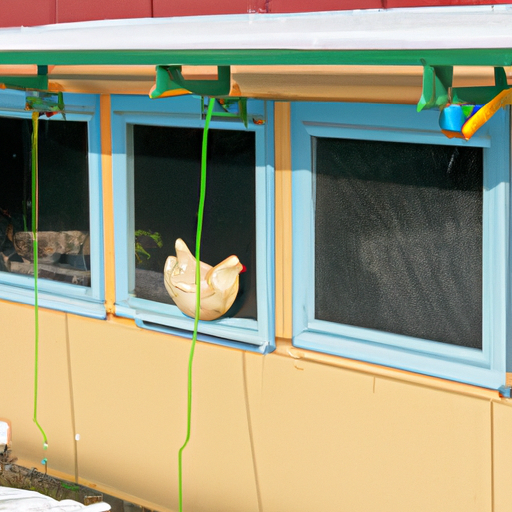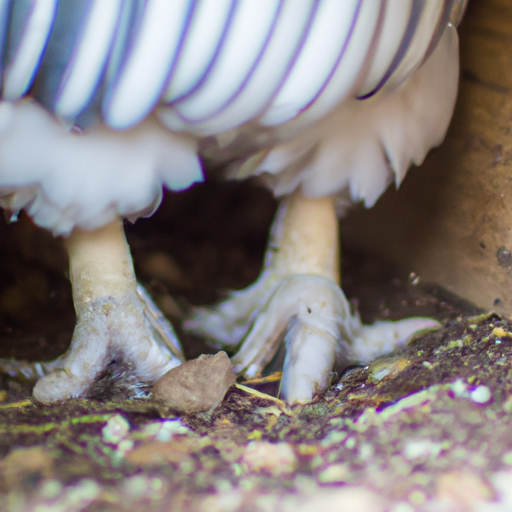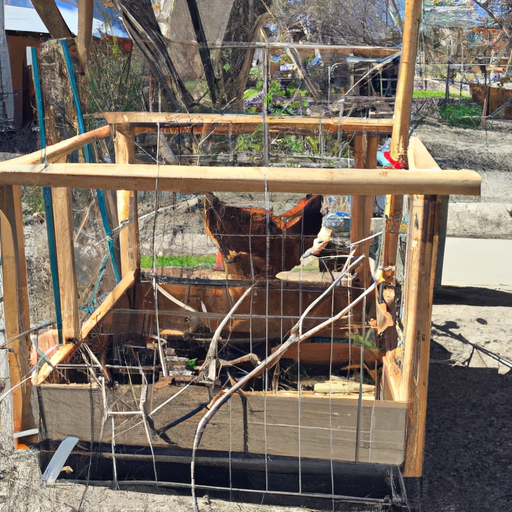Are you a chicken enthusiast dreaming of having your own flock in your urban garden? If so, you might be wondering how to introduce chickens without causing any harm to your precious plants. Well, fear not! In this article, we will explore practical solutions for introducing chickens to your urban oasis while also addressing any potential concerns your neighbors might have. So, let’s dive into this feathered adventure and find out how you can peacefully coexist with your leafy greens and maintain a harmonious relationship with those around you.
How to Introduce Chickens to an Urban Garden without Damaging Plants
Choosing the right chicken breed
When introducing chickens to your urban garden, it’s essential to choose the right breed that is well-suited for urban living. Opt for smaller breeds that are known for their docile and calm nature. Some popular urban chicken breeds include the Rhode Island Red, Sussex, and Orpington. These breeds are known for being friendly towards humans and less likely to cause damage to plants.
Preparing the garden
Before introducing chickens to your garden, it’s important to make sure the area is adequately prepared. Ensure that any poisonous plants or hazardous materials are removed from the garden to ensure the safety of the chickens. Additionally, consider setting up a perimeter fence to prevent the chickens from wandering into areas where they may potentially damage plants.
Building a chicken coop
To provide your chickens with a safe and secure environment, it’s essential to build a chicken coop. The coop should be spacious enough to accommodate the number of chickens you plan to have and should provide adequate protection from predators. Make sure to include nesting boxes, perches, and proper ventilation within the coop.
Introducing the chickens gradually
When introducing chickens to a new environment, it’s important to do so gradually to minimize stress on the birds. Before allowing them free range in the garden, start by keeping them confined to their coop for the first few days. This helps them acclimate to their new surroundings and reduces the likelihood of them causing damage to plants out of excitement.
Protecting plants from chicken damage
To prevent your chickens from damaging plants in your garden, implement various techniques. Use physical barriers like chicken wire or fencing to create designated areas for the chickens to roam. Additionally, consider using deterrents like motion-activated sprinklers or reflective objects to discourage chickens from nibbling on plants. Planting sturdy and deep-rooted plants that are less susceptible to damage can also help minimize potential destruction.
Supervising and training the chickens
Regular supervision and training are crucial in ensuring that your chickens behave appropriately in the garden. Keep an eye on them during their initial free-ranging periods, correcting any undesirable behaviors like scratching or pecking at plants. Establish a routine and use positive reinforcement to train them to stay away from sensitive areas in the garden.
Implementing pest control measures
One of the benefits of having chickens in your urban garden is their natural pest control abilities. Chickens love to eat insects, slugs, and snails, helping to keep the garden free from harmful pests. Encourage the chickens to forage by providing them with compost piles or designated areas with plant debris where pests commonly reside.
Covering sensitive plants
If you have particularly delicate or valuable plants in your garden, consider covering them with netting or cloths to protect them from potential chicken damage. This will allow the chickens to roam freely without causing harm to your more vulnerable plants.
Using chicken-friendly landscaping techniques
Incorporating chicken-friendly landscaping techniques can help minimize potential damage caused by chickens while still allowing them to enjoy the garden. Planting dense shrubs or creating designated areas with mulch or gravel can provide the chickens with alternative spaces to scratch and forage without harming delicate garden beds or plantings.
Regular maintenance and monitoring
Maintaining a healthy and harmonious balance between your chickens and your garden requires regular maintenance and monitoring. Stay attentive to any signs of overgrazing or damage caused by the chickens and take necessary steps to correct the situation. Regularly check for any potential hazards or security breaches in the chicken coop or fencing, ensuring the safety of both your chickens and garden.
Solutions for Managing Neighbor Complaints or Concerns about Urban Chicken Flocks
Informing neighbors beforehand
Before bringing chickens into your urban garden, it’s crucial to inform your neighbors of your plans. This allows them to be aware of the addition to the neighborhood and gives them the opportunity to voice any concerns they may have. Open and honest communication from the start can help ease potential tensions and foster a sense of understanding.
Addressing concerns and answering questions
When neighbors express concerns or ask questions about your urban chicken flock, it’s important to address them promptly and honestly. Take the time to listen to their concerns and provide them with accurate and reliable information about urban chicken keeping. Be willing to educate them on the benefits of chickens in an urban setting and offer reassurance regarding any fears or misconceptions they may have.
Being a responsible chicken owner
Being a responsible chicken owner goes a long way in managing neighbor complaints or concerns. Ensure that your chickens are well cared for, including providing proper food, water, and shelter. Keep the coop clean and odor-free, and promptly address any issues like noise or escaped chickens. Demonstrating responsible ownership can help alleviate any concerns your neighbors may have.
Managing noise levels and odors
To address potential complaints about noise and odors, take proactive steps to manage these aspects of urban chicken keeping. Choose chicken breeds known for their quieter nature and avoid roosters, as they are the primary contributors to noise. Regularly clean the coop and dispose of waste appropriately to minimize odors. Implementing good coop management practices can help keep noise and odors at acceptable levels.
Ensuring proper sanitation and cleanliness
Maintaining proper sanitation and cleanliness in and around the chicken coop is essential when dealing with neighbor concerns. Properly disposing of chicken waste, regularly cleaning the coop, and ensuring there are no pest or rodent issues can help alleviate concerns about health and hygiene.
Offering eggs and other benefits
One effective solution to managing neighbor complaints is to offer them the benefits of your urban chicken flock. Sharing fresh eggs or other chicken-related benefits is a great way to build positive relationships with your neighbors. It allows them to directly experience the advantages of having chickens in the neighborhood and may help foster understanding and acceptance.
Designating quiet hours for the chickens
To minimize noise disturbances, consider designating specific quiet hours for your chickens. Restrict their outdoor access during early mornings or late evenings when noise levels may disturb neighbors. This gesture demonstrates a willingness to be considerate of your neighbors’ peace and quiet.
Implementing privacy measures
If privacy is a concern for your neighbors, consider implementing privacy measures around the chicken coop or designated areas. This could include installing taller fencing or using landscaping techniques like planting dense shrubs or climbing vines to create visual barriers. Respecting your neighbors’ need for privacy can help maintain positive relationships.
Collaborating with neighbors on shared concerns
Creating an open dialogue with your neighbors and collaborating on shared concerns can go a long way in managing potential conflicts. Discuss common issues like pest control, noise, or cleanliness and explore possible solutions together. By addressing concerns collectively, you can demonstrate a commitment to working together for the benefit of the entire community.
Seeking mediation or involvement of local authorities if necessary
In situations where neighbor complaints persist despite efforts to address concerns, seeking mediation or involving local authorities may be necessary. Mediation can provide a neutral ground for all parties involved to express their grievances and work towards a resolution. Involving local authorities can help enforce any existing regulations or codes related to urban chicken keeping and ensure fair and equitable resolutions are reached.
By following these guidelines for introducing chickens to an urban garden and effectively managing neighbor complaints or concerns, you can successfully create a harmonious environment where both your chickens and neighbors can coexist happily. With proper planning, communication, and responsible ownership, you can enjoy the benefits of freshly laid eggs and a thriving garden in your urban oasis.




